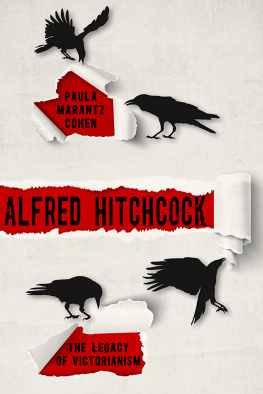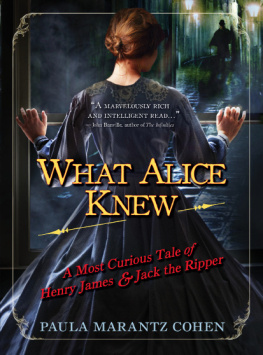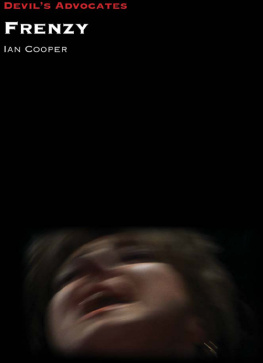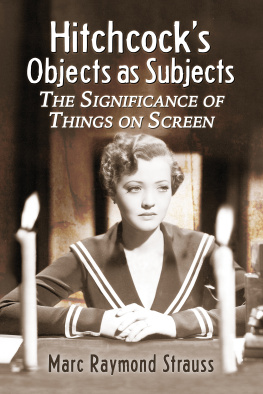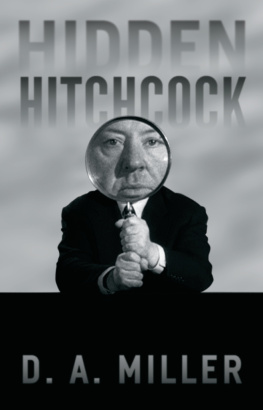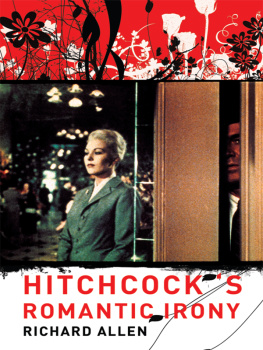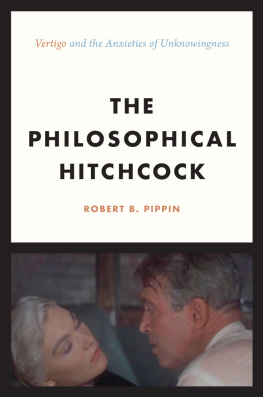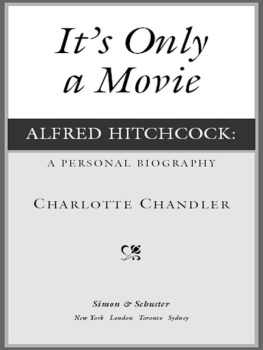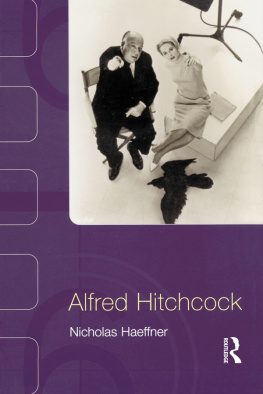Contents
Page List
Guide
Alfred Hitchcock
The Legacy of Victorianism
Alfred Hitchcock
The Legacy of Victorianism
Paula Marantz Cohen
Paperback edition 2021
Copyright 1995 by The University Press of Kentucky
Scholarly publisher for the Commonwealth,
serving Bellarmine University, Berea College, Centre
College of Kentucky, Eastern Kentucky University,
The Filson Historical Society, Georgetown College,
Kentucky Historical Society, Kentucky State University,
Morehead State University, Murray State University,
Northern Kentucky University, Spalding University,
Transylvania University, University of Kentucky,
University of Louisville, and Western Kentucky University.
All rights reserved.
Editorial and Sales Offices: The University Press of Kentucky
663 South Limestone Street, Lexington, Kentucky 40508-4008
www.kentuckypress.com
Cataloging-in-Publication data is available from the Library of Congress.
ISBN 978-0-8131-5189-2 (pbk. : alk. paper)
ISBN 978-0-8131-5328-5 (epub)
This book is printed on acid-free paper meeting the requirements of the American National Standard for Permanence in Paper for Printed Library Materials.
Manufactured in the United States of America
Member of the Association of University Presses
Contents
Acknowledgments
T he first and most fundamental influence on this book comes from my parents, Murray and Ruth Marantz Cohen. Their talk, sometimes at cross-purposes, always invigorating, lies at the heart of my method. I would also like to thank my sister, Rosetta Marantz Cohen, whose critical spirit and humor have kept me honest; my husband, Alan S. Penziner, who acted as a trusted reader and beloved movie companion; and my colleague, D.B. Jones, with whom I taught the Hitchcock course that served as the inspiration for this book. I would also like to thank a number of colleagues and friends whose insights on Hitchcock and related matters have helped me generate new ideas and revise old ones: Rosemary and Fred Abbate, David Plaut, Mark Greenberg, Beth Kowaleski-Wallace, Frank Nesko, Gertrude Penziner, and Samuel Scheer. This book was written during a sabbatical leave granted by Drexel University.
Photo stills were provided by the Museum of Modern Art in New York City.
An earlier version of appeared under the title The Ideological Transformation of Conrads The Secret Agent into Hitchcocks Sabotage in Literature/Film Quarterly 22, 3(1994), and is reprinted by permission.
Introduction
A lfred Hitchcocks career spans the greater part of the twentieth century. He made his directorial debut in 1922, his last film in 1975, and he was still trying to shape a new project at his death in 1980. His work is a mirror of cinematic development: from silent to sound, from black and white to color, from the shoestring productions of his early London years to the expensive vehicles of his Hollywood period. In the process, he dabbled in technical innovations such as 3-D and VistaVision, experimented in special effects and editing techniques, and developed an extensive repertoire of original camera setups and shots. He evolved with the times in other respects as well. He treated sex and violence first indirectly, then in stylized representation, and finally with graphic directness. He employed actors who epitomized the taste of each period in which he worked: Robert Donat and Madeleine Carroll during his British period, and Ingrid Bergman, James Stewart, Grace Kelly, and Cary Grant during his most successful Hollywood years. In his last filmsFrenzy and Family Plothe chose to employ British repertory performers in one case and Hollywood newcomers in the other, reflecting the emerging public taste for the quirky, nonstellar cast.
Yet for all his uncanny ability to reflect evolving fads and trends, Hitchcock was also doggedly unstylish. He presented himself as a bourgeois family man, seemingly indifferent to the glamorous hedonism of Hollywood. His highly mannered, uninflected speech and his bulky, inert figure suggested the Victorian gentleman stranded in a more frivolous age. Indeed, he seemed to relish the image of himself as a physical anachronism, and he capitalized upon the marketability of this image, even to the point of appearing as a corporeal signature in most of his films.
Hitchcocks choice of the formal Victorian persona on the one hand and his drive to satirize and commercialize that persona on the other describe the underlying dynamic of his career. He was the son of small London tradespeopleuneducated, modest in their means, churchgoing, and scrupulously conventional. His parents were Victorians, citizens of a still complacent Britain, in whom attitudes regarding the individual, the family, and the moral life were deeply inculcated. Hitchcock did not repudiate the Victorian world into which he was born. Instead, he carried the values of his childhood into cinema, transformed them in the process, and then proceeded to transform cinema through the continued infusion of these values.
Critical approaches to Hitchcock have occupied two extremes. One, associated with the auteur theory of the 1960s and early 1970s, has tended to ignore context and examine the films as the unique expression of a gifted personality. The other, more recently promulgated by feminist and deconstructionist critics, has read Hitchcocks films as social textspowerful reflectors and enforcers of ideology. My approach bridges these two extremes or, rather, finds them not to be mutually exclusive. Hitchcocks films are certainly ideological artifacts and not without their propagandistic function, yet they also exhibit a distinctiveness and a developmental continuity that demonstrate their passage through a singular, if ever-changing, filter. This filter is the person of the filmmaker.1
I conceive of Hitchcocks career as falling into three phases, each of which reflects the convergence of his personal experience with trends in cinematic development and more general trends in culture.
The first phase marks Hitchcocks initiation into the technical and thematic conventions of his craft and spans the more than fifteen years in which he directed films in Britain. While his technical acumen and stylistic originality became apparent very early, these films nonetheless conform to a general tendency within the nascent genre of narrative film to oppose the kind of complex characterizations associated with nineteenth-century novels. These films also encode conventional gender and familial relationships that correspond to the form of Hitchcocks own newly created family during this period.

